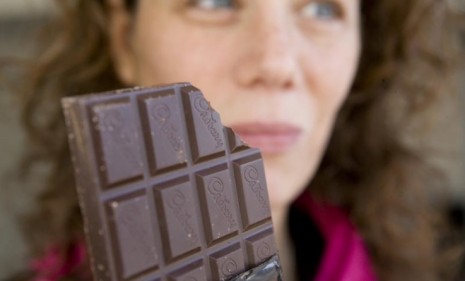Climate change: Will chocolate become a costly luxury?
If temperatures continue to rise, a new report suggests, West Africa, source of half the world's chocolate, will be unfit to grow the coveted beans

A free daily email with the biggest news stories of the day – and the best features from TheWeek.com
You are now subscribed
Your newsletter sign-up was successful
Is the world's cocoa supply in danger? That's what a new study from the International Center for Tropical Agriculture (CIAT) suggests, singling out a familiar culprit: Global warming. The findings [see PDF] reveal that annual temperature increases will hamper the crop-production efforts in West Africa, which currently supplies half of the world's chocolate — at least if preventive measures aren't taken. Here's what you should know:
How hot are we talking?
The study, which consulted 19 climate-change models, indicates that a mere two degrees Celcius increase by 2050 will render areas like Ghana and the Ivory Coast too hot to grow cocoa, says The Washington Post. As cocoa trees struggle to obtain enough water, the developmental stages of cocoa pods that house "the prized cocoa bean" — source of the chocolate we know and love — would be disturbed. The effects of a shortage — including a leap in the price of chocolate — could be felt as soon as 2030.
The Week
Escape your echo chamber. Get the facts behind the news, plus analysis from multiple perspectives.

Sign up for The Week's Free Newsletters
From our morning news briefing to a weekly Good News Newsletter, get the best of The Week delivered directly to your inbox.
From our morning news briefing to a weekly Good News Newsletter, get the best of The Week delivered directly to your inbox.
Well, why not just move the cocoa trees elsewhere?
Rachel Cernansky of TreeHugger points out that "the ideal conditions for cocoa-growing will shift to higher altitudes — but most of West Africa is relatively flat, so there is not a lot of land at higher elevation to move to." Plus, clearing forests to pave way for farmland may actually end up "exacerbating climate change even further."
How would a shortage affect the region?
The cocoa trees play an "absolutely critical role" in the region's rural life, says CIAT's Dr. Peter Läderach, who authored the study. Hundreds of thousands of smallholder farmers use "their cocoa trees like ATM machines," he says. "They pick some pods and sell them to quickly raise cash for school fees or medical expenses."
A free daily email with the biggest news stories of the day – and the best features from TheWeek.com
What kind of preventive measures can be taken?
Farmers could diversify their crops to "spread the risk" and avoid being overly dependent on cocoa, notes TreeHugger's Cernansky. Other solutions include using shady trees to cool growing areas and developing irrigation systems that aren't exclusively weather-dependent.
Sources: CIAT, Reuters, TreeHugger, Washington Post
-
 ‘This is something that happens all too often’
‘This is something that happens all too often’Instant Opinion Opinion, comment and editorials of the day
-
 House votes to end Trump’s Canada tariffs
House votes to end Trump’s Canada tariffsSpeed Read Six Republicans joined with Democrats to repeal the president’s tariffs
-
 Bondi, Democrats clash over Epstein in hearing
Bondi, Democrats clash over Epstein in hearingSpeed Read Attorney General Pam Bondi ignored survivors of convicted sex offender Jeffrey Epstein and demanded that Democrats apologize to Trump